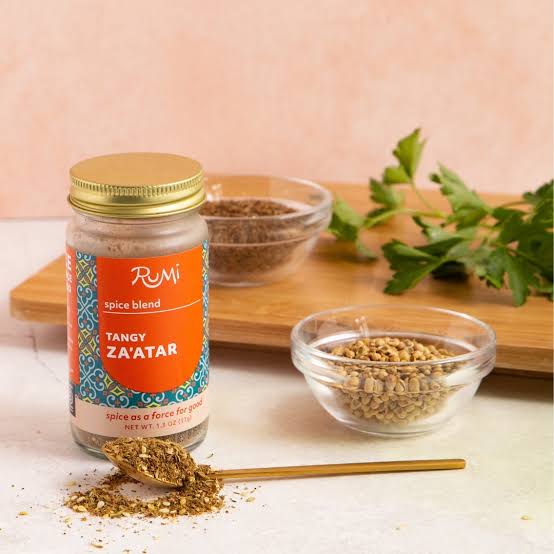Zatar is a special spice that many people enjoy using in their cooking. It comes from a plant called thyme, which grows in the Mediterranean region. Zatar has a unique flavor that is a little bit tangy and a little bit earthy. People have been using it for centuries to add flavor and taste to their food.
One of the great things about Zatar is that it is so versatile. You can use it in all kinds of dishes, from meat and poultry to vegetables and bread. It’s a popular spice in Middle Eastern cuisine, where it’s often mixed with olive oil and used as a dip for bread. This mixture is called “Zatar dip” and is a favorite snack in many countries.
Zatar is not just tasty; it’s also good for you. It contains a variety of vitamins and minerals, like vitamin C and iron. These nutrients can help keep you healthy and give you energy. Some people even believe that Zatar has medicinal properties and can help with digestion and other health issues.
To use Zatar, you simply sprinkle it on your food or mix it into a recipe. It’s a simple way to add a burst of flavor to your dishes. You can also experiment with Zatar by combining it with other spices to create your own unique seasoning blends.
If you havenever tried Zatar before, I encourage you to give it a shot. It’s an easy way to make your meals more exciting and flavorful. Whether you’re a seasoned chef or just someone who enjoys cooking at home, Zatar is a spice that can elevate your culinary creations to new heights.
Read Also: Reasons why Pregnant Sheep Die by the Road-side and How to Control it
14 Health Benefits of Zatar Spice

Zatar spice, also known as za’atar, is a delightful herb and spice blend with a rich history and potential health benefits. While scientific research on its health effects is still ongoing, here are 14 potential benefits associated with Zatar:
1. Rich in Antioxidants: Zatar contains herbs like thyme and oregano, which are rich in antioxidants. These compounds help protect your cells from damage caused by free radicals.
2. Anti-Inflammatory Properties: Some ingredients in Zatar, like thyme and sumac, may possess anti-inflammatory properties that could benefit conditions related to inflammation.
3. Digestive Aid: Zatar may aid digestion due to its carminative properties. It can help soothe an upset stomach and reduce gas and bloating.
4. Improved Cognitive Function: Certain compounds in Zatar herbs, such as thymol, may have cognitive-enhancing effects and improve memory and concentration.
5. Immune System Support: The vitamins and minerals in Zatar, including vitamin C and iron, can help support a healthy immune system.
6. Heart Health: Zatar’s antioxidant properties may contribute to cardiovascular health by reducing the risk of oxidative stress-related heart issues.
7. Potential Antibacterial Effects: Some studies suggest that Zatar herbs, like thyme, have antibacterial properties, which can help combat harmful bacteria.
8. Weight Management: Zatar is low in calories and can be used to add flavor to dishes without adding extra calories, making it a useful tool for weight management.
9. Blood Sugar Regulation: Some research suggests that Zatar may help regulate blood sugar levels, which is beneficial for individuals with diabetes or those at risk.
10. Anti-Cancer Properties: Certain compounds in Zatar herbs, such as carvacrol and thymol, have shown potential anti-cancer properties in preliminary studies.
11. Respiratory Health: The aromatic herbs in Zatar, like thyme, can be beneficial for respiratory health and may help with conditions like coughs and bronchitis.
12. Bone Health: Zatar contains minerals like calcium, which is essential for maintaining strong and healthy bones.
13. Skin Health: The antioxidants in Zatar may contribute to healthier skin by preventing premature aging and skin damage.
14. Anti-Anxiety Effects: Some of the herbs in Zatar, like oregano, may have calming effects that can help reduce anxiety and stress.
While Zatar offers potential health benefits, it’s essential to remember that these claims are based on traditional use and preliminary research. For specific health concerns, it’s advisable to consult a healthcare professional. Additionally, Zatar is best enjoyed as part of a balanced diet and should not be used as a sole remedy for health issues.
Uses of Zatar Spice

Zatar spice, also known as za’atar, is a versatile and flavorful blend that can be used in various culinary applications. Here are some common uses of Zatar spice:
1. Seasoning for Bread: Zatar is often mixed with olive oil and used as a topping for flatbreads, pita, or focaccia. It’s a popular choice for making delicious Za’atar bread.
2. Dip: Mix Zatar with olive oil to create a savory dip for bread. This mixture is a staple in Middle Eastern cuisine and is great for dipping fresh bread into.
3. Salad Dressing: Sprinkle Zatar over salads or use it as a seasoning for homemade salad dressings to add a unique and zesty flavor.
4. Grilled Meats: Zatar works wonderfully as a rub or marinade for grilled meats like chicken, lamb, or beef, imparting a delightful herbaceous flavor.
5. Roasted Vegetables: Toss vegetables like potatoes, carrots, or cauliflower with olive oil and Zatar before roasting for a flavorful side dish.
6. Scrambled Eggs: Add a pinch of Zatar to scrambled eggs or omelets for a delicious and aromatic breakfast.
7. Yogurt or Labneh: Sprinkle Zatar on yogurt or labneh (strained yogurt) as a topping, creating a savory and tangy snack or side dish.
8. Hummus: Mix Zatar into hummus for an extra layer of flavor and a unique twist on this classic dip.
9. Rice and Grain Dishes: Use Zatar as a seasoning for rice, quinoa, or couscous dishes to infuse them with a Middle Eastern flair.
10. Soup and Stew Enhancer: A pinch of Zatar can be added to soups and stews for an aromatic boost of flavor.
11. Marinades: Create flavorful marinades for tofu or seafood by combining Zatar with olive oil, lemon juice, and your favorite spices.
12. Popcorn Seasoning: Sprinkle Zatar on freshly popped popcorn for a tasty and unique snack.
13. Vegetarian and Vegan Dishes: Zatar can enhance the flavor of vegetarian and vegan dishes, such as roasted vegetables, plant-based proteins, and grain bowls.
14. Dips and Spreads: Incorporate Zatar into dips and spreads like tzatziki, tahini, or baba ghanoush for added complexity.
15. Homemade Seasoning Blend: Experiment with Zatar by combining it with other spices to create your own unique seasoning blends for various dishes.
Zatar’s distinct flavor profile, featuring aromatic herbs like thyme and oregano, along with tangy sumac, makes it a versatile and beloved spice blend in Middle Eastern and Mediterranean cuisines. Feel free to explore and get creative with how you use Zatar in your cooking to elevate your dishes with its unique taste.
Read Also: Breed Characteristics for Selecting Sheep
Where to Find the Zatar Spice near Me/You

You can typically find Zatar spice in various places, both online and in physical stores. Here are three perfect places to locate Zatar spice near you:
1. Middle Eastern or Mediterranean Grocery Stores: These specialized grocery stores often have a wide selection of Middle Eastern and Mediterranean spices, including Zatar. You’re likely to find different brands and variations of Zatar spice blends in these stores.
2. Online Retailers: Popular online retailers like Amazon, eBay, and specialty spice shops often carry Zatar spice. You can browse a variety of options, read reviews, and have it delivered to your doorstep.
3. Local Spice Shops or Specialty Food Stores: Some local spice shops or specialty food stores carry a range of international spices, including Zatar. These stores may offer high-quality Zatar blends, and the staff can often provide guidance on how to use it in your cooking.
Before purchasing Zatar spice, consider your preferences and dietary restrictions. There are different variations of Zatar blends, so you may want to explore which one suits your taste best. Additionally, check the expiration date to ensure the spice is fresh and flavorful.
Read Also: How to Improve Your Financial Literacy
